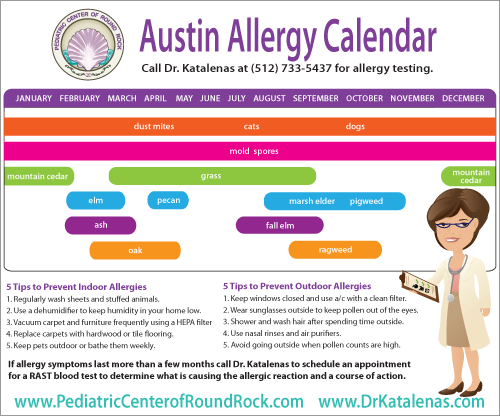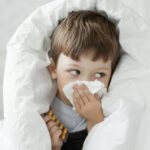Controlling Austin Allergies So Your Child Can Play Outside
Controlling Austin Allergies So Your Child Can Play Outside
Is your child suffering from Austin allergies?
In today’s fight against childhood obesity, one of the most important components is to encourage children to be more active. “Being active” can simply mean playing, which children love to do. It’s in children’s nature to play, and it’s vital. But the most active play takes place outside… and playing outside can be uncomfortable and even dangerous for children who suffer from allergies.
 In Central Texas, the passage of time is marked by the onset of Cedar Fever symptoms from December through February. The annual itchy eyes and dripping nose are as regular in the Central Texas as snowfall is in Boston. In most parts of the country, the winter months provide respite to allergy sufferers, but in the Austin area, the pollination of the Mountain Cedar takes place during these months, and this tree is highly allergenic. Of course, Cedar Fever is just one type of allergy; kids everywhere also suffer from allergies to food, pets, dust, mold, latex, and more.
In Central Texas, the passage of time is marked by the onset of Cedar Fever symptoms from December through February. The annual itchy eyes and dripping nose are as regular in the Central Texas as snowfall is in Boston. In most parts of the country, the winter months provide respite to allergy sufferers, but in the Austin area, the pollination of the Mountain Cedar takes place during these months, and this tree is highly allergenic. Of course, Cedar Fever is just one type of allergy; kids everywhere also suffer from allergies to food, pets, dust, mold, latex, and more.
Children who suffer from allergies are more likely to have asthma. In fact, according to the American Academy of Pediatrics, 70-80% of school-aged children with asthma also have allergies. Parents must take allergies seriously.
What Should Parents Do if They Suspect Allergies?
When a parent suspects her child suffers from allergies, the first thing she must do is to confirm her suspicion. At the Pediatric Center of Round Rock, pediatricians can diagnose allergies by taking a complete medical history with questions specific to allergy symptoms. They can also perform a RAST (radioallergosorbent) blood test to determine what substances are causing the allergic reaction.
After allergies have been diagnosed, the doctors at the Pediatric Center of Round Rock may refer patients and their parents to an allergy specialist, depending on the severity of the symptoms. Allergies can’t be cured, but they can be controlled.
What Should Parents Do after their Child Has Been Diagnosed with Allergies?
Parents of children with allergies must reduce the child’s exposure to the allergen. For example, children with pet allergies should, ideally, not have a pet in the home. If that’s not acceptable to the family, then the pet should be kept out of the child’s room and must be bathed frequently. Vacuuming pet hair frequently is also a must.
Children who are allergic to specific foods, such as peanuts, must be vigilant to avoid the hidden peanuts that are present in many foods. Parents must teach their children to read labels thoroughly.
Children who suffer from Cedar Fever, Hay Fever, or other pollen allergies should not play outside when the pollen count is high. The National Allergy Bureau tracks pollen counts across the country. The pollen count for the Austin area is tracked from Georgetown. Parents should sign up for an email alert so they will always know when the pollen count is dangerously high. At those times, the windows should be closed and the air conditioner turned on in the home.
Print Our Chart for Ten Tips to Prevent Allergies

Ten Tips to Prevent Allergies > Print the Austin Allergy Chart
We’ve created a chart for the Austin area that you can print and post in your home to help you learn when to expect allergies and some tips to help you control allergy reactions in your child. If you determine that your child is having consistent and long-term allergy reactions, please call us at (512) 733-5437 to schedule an evaluation. Austin is known for having some of the most severe allergies in the country, contact us, we can help.
How Can Parents Encourage Children with Allergies to Be Active?
When “go outside and play” is not an option for a child who suffers from outdoor allergies, how can parents encourage him to be active and fit? As a family, parents and children with allergies should come up with strategies for remaining active when allergy season hits. Games such as Wii Fit and X-Box Kinect can help, as long as games are chosen that will truly get the child moving. Old-fashioned games such as Twister, too, can make being active fun for children forced to stay indoors.
Childhood obesity is as significant a health concern as allergies are. It’s important that all children, regardless of allergies, get regular exercise through play.

 Previous Post
Previous Post Next Post
Next Post



